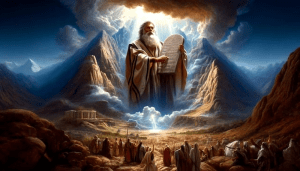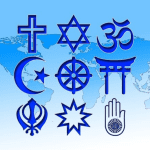
One aspect (Immanuel Kant would argue the only aspect of value) of religion on society is its insistence on an ethical code or manner of conduct.
Nevertheless, if he is honest, even the most ardent anti-Catholic must admit the enormous contribution Catholicism has had to the development of law, particularly in the West. It is this contribution that I will examine in this paper.
The Need For Law
Catholicism – following the Bible – states that human beings are made in the image of God. If this is true, and God is holiness and justice itself, why is there any need for man-made laws?
One can only speculate, but it seems likely that the damage done to human nature by the effects of original sin necessitated the development of human law. I do not think it is coincidental that the Bible depicts a murder immediately after the Fall (See Genesis, chapter four).
The Books of Samuel appear to bolster the position that human beings were intended to be governed directly by God. (See 1 Samuel 8). While Scripture implies that God was to act as the lawgiver and judge, the need for human law arose due to people turning away from God.
From this, we can infer the existence of two types or tiers of law: one divine and the other human.
The Two Laws
To be sure, the belief in two types of law predates Christianity. A famous example comes from the Greek play Antigone, written by Sophocles some four hundred years before Christ. In it, the protagonist, Antigone, ignores the King’s decree and buries her brother, citing a higher law that she must obey.
From a Catholic perspective, Antigone is acting in accordance with natural law above the precepts of man-made or positive law.
If the mind of God is the eternal law, then natural law is the rational creature’s cooperation with the will of God. (See Aquinas, Saint Thomas. The “Summa Theologica” of St. Thomas Aquinas. 1917). Since God has willed all things into existence, He also wills to guide or direct them to their end or highest good.
This guidance manifests in two ways. For inanimate things, determinism reigns. However, for ensouled beings, the capacity for free will allows them to cooperate (or not) with the divine will as known to them by reason.
Owing to his intelligence and free will, man is the master of his conduct. Unlike the things of the purely material world, humans can vary their actions, acting or abstaining as they please. In no way, however, should this be construed to suggest that human beings are to be lawless creatures in an ordered universe.
Rather, human nature is so constituted that we are aware of those precepts dictated by the mind of God. To the extent that our actions conform to those precepts, we are said to act morally. We are said to act immorally to the extent that our actions are at variance with them.
Positive or man-made law draws on this innate (natural) knowledge of morality in two ways. The first way is by simply codifying natural law. For example, prohibitions on murder and rape are extensions of the Ten Commandments and the Deuteronomic Code. In the second way, positive law establishes specific ways of acting in accordance with natural law but does not directly conclude from it. Examples include traffic laws, taxes, and contractual laws.
The Catholic Effect
As seen in the Antigone example above, the concept of a rule of law that stood above human decrees was known in several ancient civilizations. Still, the Catholic Church’s development of canon law in the Middle Ages, specifically the emergence of ecclesiastical courts under Pope Gregory VII, provided post-Roman Empire Europe with a model to replace the Justinian code (codified Roman laws).
The Catholic concept of divine logos, which imbued the world with order, was of even greater significance. The idea that specific laws governed the world stemmed directly from the Catholic belief in a transcendent God as well as in immutable principles that exist independently of the laws of man. These beliefs provided much of what was to be called common law.
As the scholar John C. H. Wu writes, “Common law presupposed that the same God who governs the ‘laws of nature’ (such as gravity) also governs the ‘natural law,’ those universally binding moral precepts that are knowable to all men and women because they are written on the tablets of their heart. (See Romans 2:15).
This belief in a divine lawgiver was given an American voice by Thomas Jefferson’s observation that “All men are endowed by their creator with certain unalienable rights.” In 1829, Supreme Court Justice Joseph Story wrote, “There never has been a period in which the Common Law did not recognize Christianity as lying at its foundations.”
Concepts such as intent and liability are also derived from a Catholic sensibility. The Catholic understanding of the nature of guilt and innocence led to the eventual replacement of determining culpability by ordeals of fire and water.
Catholic natural law tradition and the Catholic understanding of the unity of the human race contributed much to the emergence of international law.
This, in turn, affected how the European powers interacted with the inhabitants of the “New World.” After all, if all humans are reflections of God, then what is done to the least of us is done onto Christ (Matthew 25:40).
Conclusion
The construct of law presupposes two principles—first, the existence of a lawgiver. In the Christian tradition, this lawgiver is, of course, God. God’s precepts, as manifested in natural law, provide an objective moral component to positive law.
The second principle is that human beings possess free will. This capacity for free will enables human beings to cooperate with or rebel against God’s will.
In the preceding essay, I have endeavored to explore how the Catholic tradition has influenced and even provided the foundation for the legal systems in Western Civilization.













